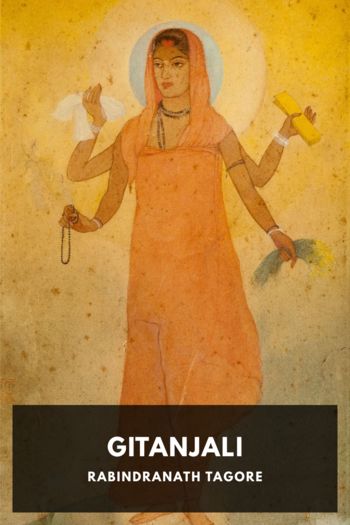Gitanjali - Rabindranath Tagore (classic novels to read .txt) 📗

- Author: Rabindranath Tagore
Book online «Gitanjali - Rabindranath Tagore (classic novels to read .txt) 📗». Author Rabindranath Tagore
I have carried the manuscript of these translations about with me for days, reading it in railway trains, or on the top of omnibuses and in restaurants, and I have often had to close it lest some stranger would see how much it moved me. These lyrics—which are in the original, my Indians tell me, full of subtlety of rhythm, of untranslatable delicacies of colour, of metrical invention—display in their thought a world I have dreamed of all my life long. The work of a supreme culture, they yet appear as much the growth of the common soil as the grass and the rushes. A tradition, where poetry and religion are the same thing, has passed through the centuries, gathering from learned and unlearned metaphor and emotion, and carried back again to the multitude the thought of the scholar and of the noble. If the civilization of Bengal remains unbroken, if that common mind which—as one divines—runs through all, is not, as with us, broken into a dozen minds that know nothing of each other, something even of what is most subtle in these verses will have come, in a few generations, to the beggar on the roads. When there was but one mind in England, Chaucer wrote his Troilus and Cressida, and though he had written to be read, or to be read out—for our time was coming on apace—he was sung by minstrels for a while. Rabindranath Tagore, like Chaucer’s forerunners, writes music for his words, and one understands at every moment that he is so abundant, so spontaneous, so daring in his passion, so full of surprise, because he is doing something which has never seemed strange, unnatural, or in need of defence. These verses will not lie in little well-printed books upon ladies’ tables, who turn the pages with indolent hands that they may sigh over a life without meaning, which is yet all they can know of life, or be carried by students at the university to be laid aside when the work of life begins, but as the generations pass, travellers will hum them on the highway and men rowing upon the rivers. Lovers, while they await one another, shall find, in murmuring them, this love of God a magic gulf wherein their own more bitter passion may bathe and renew its youth. At every moment the heart of this poet flows outward to these without derogation or condescension, for it has known that they will understand; and it has filled itself with the circumstance of their lives. The traveller in the red-brown clothes that he wears that dust may not show upon him, the girl searching in her bed for the petals fallen from the wreath of her royal lover, the servant or the bride awaiting the master’s homecoming in the empty house, are images of the heart turning to God. Flowers and rivers, the blowing of conch shells, the heavy rain of the Indian July, or the moods of that heart in union or in separation; and a man sitting in a boat upon a river playing upon a lute, like one of those figures full of mysterious meaning in a Chinese picture, is God Himself. A whole people, a whole civilization, immeasurably strange to us, seems to have been taken up into this imagination; and yet we are not moved because of its strangeness, but because we have met our own image, as though we had walked in Rossetti’s willow wood, or heard, perhaps for the first time in literature, our voice as in a dream.
Since the Renaissance the writing of European saints—however familiar their metaphor and the general structure of their thought—has ceased to hold our attention. We know that we must at last forsake the world, and we are accustomed in moments of weariness or exaltation to consider a voluntary forsaking; but how can we, who have read so much poetry, seen so many paintings, listened to so much music, where the cry of the flesh and the cry of the soul seems one, forsake it harshly and rudely? What have we in common with St. Bernard covering his eyes that they may not





Comments (0)